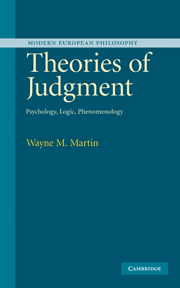Book contents
- Frontmatter
- Contents
- List of figures
- Acknowledgments
- Principles of citation
- Introduction: the faces of judgment
- 1 The psychology of judging: three experimental approaches
- 2 Judgment as synthesis, judgment as thesis: existential judgment in Kantian logics
- 3 The judgment stroke and the truth predicate: Frege and the logical representation of judgment
- 4 Heidegger and the phenomeno-logic of judgment: methods of phenomenology in the dissertation of 1913
- 5 Elements of a phenomenology of judgment: judgmental comportment in Cranach's Judgment of Paris
- Bibliography
- Index
1 - The psychology of judging: three experimental approaches
Published online by Cambridge University Press: 22 September 2009
- Frontmatter
- Contents
- List of figures
- Acknowledgments
- Principles of citation
- Introduction: the faces of judgment
- 1 The psychology of judging: three experimental approaches
- 2 Judgment as synthesis, judgment as thesis: existential judgment in Kantian logics
- 3 The judgment stroke and the truth predicate: Frege and the logical representation of judgment
- 4 Heidegger and the phenomeno-logic of judgment: methods of phenomenology in the dissertation of 1913
- 5 Elements of a phenomenology of judgment: judgmental comportment in Cranach's Judgment of Paris
- Bibliography
- Index
Summary
One is always faced, then, with the unacceptable alternative of not attempting to study a primary phenomenological aspect of our human existence in relation to brain function because of the logical impossibility of direct verification by an external observer.
Libet 1985: 534Judgment is, among other things, a characteristic capacity of certain intelligent organisms, and it is thus natural to turn to empirical psychology to investigate it. Our initial set of case studies are accordingly drawn from psychology and its history. In particular, I consider in this chapter three attempts to tackle the problem of judgment experimentally. Two cases come from modern neuropsychological research; the third is by now ancient history: the eighteenth-century psychological experiments due to David Hume. The three experimental approaches diverge dramatically in their methodologies and in their conception of psychology, yet each exhibits the pattern which is the subject of this book: the entanglement of logical, psychological, and phenomenological constraints in the theory of judgment. My discussion aims both to document these entanglements and to show how, in at least two cases, they lead to experimental failure. But I also seek to extract positive results, exhibiting a substantive logical constraint on the theory of judgment (Hume's content identity condition) and a variety of patterns whereby experimentalists have sought to integrate the various faces of judgment.
- Type
- Chapter
- Information
- Theories of JudgmentPsychology, Logic, Phenomenology, pp. 14 - 41Publisher: Cambridge University PressPrint publication year: 2006

